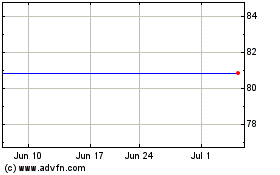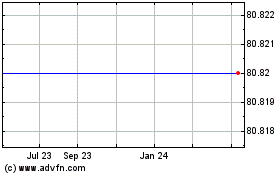US Medical Device Industry Pushes Back Against Proposed FDA Changes
October 05 2010 - 1:51PM
Dow Jones News
The $200 billion U.S. medical-device industry voiced concern
Tuesday about "potentially disruptive" proposed changes to a widely
used device-approval process at the Food and Drug Administration,
which the industry thinks should instead pursue limited
changes.
Comments from the Advanced Medical Technology Association trade
group come as the FDA closes a window for input on wide-ranging
proposals to shore up the so-called 510(k) device-approval process.
This system is relied upon heavily by big device companies,
especially makers of orthopedic implants like Zimmer Holdings Inc.
(ZMH) and Johnson & Johnson (JNJ).
But the FDA is reviewing its 510(k) rules amid criticism that
they have been too lax and inconsistently applied. Non-profit
advocacy group Public Citizen, for example, said the process "has
failed to keep dangerous and ineffective medical devices from the
market."
AdvaMed has pushed against a major overhaul, saying the process
works well already and needs only modest updating. AdvaMed last
month highlighted a report, conducted by an outside group with
AdvaMed financial backing, showing only a tiny fraction of devices
approved through the 510(k) process since 1998 were involved in
serious recalls. The device group wants to see some steps like more
training for FDA reviewers, but not other moves such as beefed up
FDA authority to rescind device approvals.
"Wholesale changes to a program that has such a strong record of
protecting American patients while facilitating innovation and
timely patient access to improved medical devices and diagnostics
are not needed," said Stephen J. Ubl, AdvaMed's president and chief
executive, in a release Tuesday.
On Monday, the FDA's deadline for comments on proposed
modifications, AdvaMed filed a 107-page report outlining its
positions. The FDA has said it could make some 510(k) changes this
year, after taking public comments into account. Though few filings
are posted on the agency's website thus far, spokeswoman Erica
Jefferson said the FDA has received more than 60 comments.
The 510(k) process can be a cheaper and faster option in
comparison with another FDA pathway that typically has higher
requirements for medical evidence, and focuses on high-risk
products. To qualify for a 510(k) review, companies must show there
is an already approved device similar to the new product.
How this requirement is interpreted has generated controversy,
including in the case of the FDA's approval for a ReGen Biologics
Inc. (RGBO) knee device in 2008. The FDA kicked off its 510(k)
review last year after issuing a self-critical report that said top
regulators bowed to outside political pressure when approving that
device.
Articles in The Wall Street Journal had pointed to the political
pressure and other irregularities in the ReGen case. ReGen said its
device was safe and effective and defended its activities before
the FDA.
Among the FDA's proposals, AdvaMed doesn't like the idea of
creating a subset of "Class II" devices--generally products with
moderate risk to patients--which would require clinical or
manufacturing data. AdvaMed has supported identifying a "small,
focused subset" of these devices, but is concerned the FDA is
targeting a much broader range of products.
Public Citizen, in contrast, voiced strong support for dividing
Class II devices and said the FDA should require clinical data for
all devices in this new Class IIb category. The FDA has said
drug-infusion pumps--ubiquitous hospital products with a history of
performance issues at multiple manufacturers, including Baxter
International Inc. (BAX)--are one example that falls into this new
category.
AdvaMed voiced concern that the FDA's proposals to resolve
confusion about certain key 510(k) terms could instead add
confusion and delay product clearances. AdvaMed also took issue
with the FDA's proposal to bolster its authority to consider
unapproved, or "off-label," device uses the actual intended uses
for products.
How doctors use approved products is up to them, but companies
can't market devices for unapproved purposes. This FDA proposal
could stop companies from dodging a review process for off-label
markets even if they are really banking on doing big business in
those markets. But the FDA's proposal "could prevent needed
technologies from reaching patients," AdvaMed argued, while saying
the FDA already has authority to deal with inappropriate device
promotion.
Further 510(k) changes could come next year after an
FDA-requested review by the nonprofit Institute of Medicine wraps
up.
-By Jon Kamp, Dow Jones Newswires; 617-654-6728;
jon.kamp@dowjones.com
SJM (NYSE:STJ)
Historical Stock Chart
From Jun 2024 to Jul 2024

SJM (NYSE:STJ)
Historical Stock Chart
From Jul 2023 to Jul 2024
